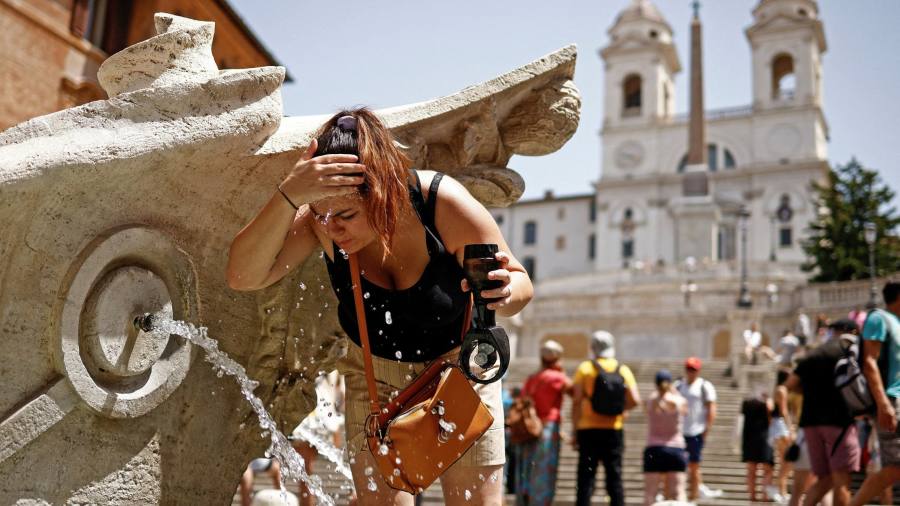Receive free Climate change updates
We’ll send you a myFT Daily Digest email rounding up the latest Climate change news every morning.
Temperatures across Europe are set to hit record highs on Wednesday, forcing countries around the Mediterranean to issue alerts, close tourist attractions and step up healthcare for heat-related illnesses.
The European Space Agency said temperatures could hit 48C in Sardinia and Sicily, while Rome and Madrid would both register temperatures in the mid to high 40Cs.
Heatwaves are becoming more common in all parts of the world, but Europe is warming faster than the global average because of its high percentage of land mass and its position on the earth’s surface.
The punishing heat in the continent is a result of an anticyclonic high pressure system named Cerberus after the mythical monster that guarded the gates of hell, by the Italian Meteorological Society. It is expected to last for at least another week and follows the hottest June on record globally. According to the Copernicus Climate Change Service, temperatures in June were 0.5C above the global average.
The heatwave comes as the world also faces a change in climatic patterns from El Niño, a cyclical weather pattern in the Pacific that prompts warmer temperatures globally.
Wildfires have broken out in Greece and Spain as a result of the heat and tourists have been warned to stay away from popular southern European destinations such as Rome and Florence. Spanish olive oil producers have warned that production could be cut by 40 per cent cent this year owing to the extreme heat causing trees to drop their fruit early, before they are fully formed.
Italian health officials declared heat emergencies in 20 cities on Tuesday, which will rise to 23 on Wednesday, while hospitals have been warned to brace for a potential surge of people suffering from heat-related problems requiring urgent attention.
In Rome, where tourists struggled to find cool or shady resting spots, the city’s protection organisation and volunteers set up 28 help points across the city to provide water, and medical assistance, to those overcome by the heat.
A study led by the Barcelona Institute for Global Health on Monday estimated that more than 61,000 people died from heat-related conditions in Europe between the end of May and beginning of September last year, with Italy the worst hit by heat. Spain and Germany were also among those with the highest numbers of mortalities from heat-related issues.
“The acceleration of warming observed over the last 10 years underlines the urgent need to reassess and substantially strengthen prevention plans, paying particular attention to the differences between European countries and regions, as well as the age and gender gaps, which currently mark the differences in vulnerability to heat,” said Hicham Achebak, researcher at the French research Inserm and a co-author of the study.
Italy’s influential farming lobby, Coldiretti, said dairy farmers had resorted to using fans and sprinkler systems to cool their livestock, as they warned of a 10 per cent drop in milk production because of animals’ heat stress.
It said farmers would suffer not just from a reduction in milk production, but higher water and energy costs as they run the cooling systems “to help the animals resist the siege of the heat”.
Luca Bergamaschi, founder of Ecco, an independent climate think-tank, said the extreme heat — just two months after Italy’s northern agricultural heartland was devastated by massive floods — should be a wake-up call to Italy’s rightwing government, which has baulked at parts of the EU’s ambitious green deal to tackle global warming.
Although Prime Minister Giorgia Meloni says members of her rightwing government are not “dangerous climate change deniers”, it has said any measures to combat climate change should be gradual so as not to affect Italy’s economy and traditions.
“The big point they miss is that if you don’t tackle climate change, you won’t have a functioning economy,” Bergamaschi said. “Climate action is the precondition to a prosperous and functioning economy.”
He said the heatwave showed the need for greater urgency in the green tradition.
“Measures of adaptation and resilience should be Italy’s two key national security priorities,” he said. “The more we delay, the more we will suffer summer after summer, winter after winter and spring after spring.”
Read the full article here




